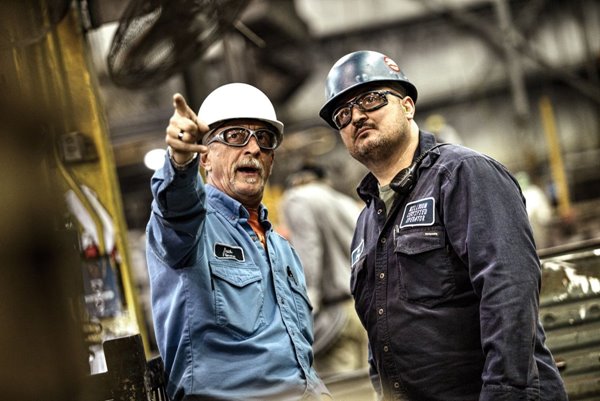Waupaca Foundry gets $400,000 in energy incentives
Dave Flessner | Chattanooga Times Free PressOn Wednesday, Waupaca Foundry cut its costs in half for the project when it was presented a check from Etowah Utilities for $399,830 as part of the industrial portion of the Energy Right program funded by the Tennessee Valley Authority. Combined with other accelerated tax depreciation on the new lights, Waupaca should quickly repay its lighting investment and the new LED lights shouldn't have to be replaced as often as the bulbs they replaced.
"This is a win for our employees who get a better work environment; a win for the environment by reducing carbon dioxide emissions by nearly 3,000 ton a year and a win for Waupaca by saving on our electric bill," said Sam Greene, general manager for the Etowah foundry.
Michael Hoecker, energy manager for Waupaca Foundry, the upgrade was made to save energy and improve worker safety.
"The biggest improvement comes from higher quality lighting and more uniform light levels on the plant floor," Hoecker said. "Increased light levels and lower shadows reduce worker eye strain and improve the quality inspection process."
Troy Moses, a shift molding foreman, said the new lighting "easily allows us to spot problem areas that may have been overlooked previously."
Waupaca officials said the lighting improvements could be the first of several energy upgrades to be made at the 14-year-old foundry, which is the biggest electricity user in Etowah.
The new lights are cutting Waupaca's energy bills about 3 percent this year. But other savings could be achieved through new technologies and investments in the company's electric furnaces used to heat, on average, 60 tons an hour of molten metal to more than 2,800 degrees Fahrenheit before the liquid metal is poured into sand patterns to make both gray and ductile iron parts for a variety of cars and trucks.
Waupaca makes about 250 different types of brake castings, differentials, and other engine and body parts ultimately used in models of most of the major auto manufacturers. The Etowah plant is the newest and smallest among the six plants operated by Waupaca, a division of the Hitachi Metals Group company.
When the automotive slump slashed automotive sales during the Great Recession, the Etowah plant was completely idled for more than a year. Greene said the plant has steadily added business and employees since it restarted in 2011 "and we're very busy right now trying to keep up with demand."
In the midst of the rebound in business last year, Waupaca hired Contemporary Energy Solutions, a Willowbrook, Ill.-based consulting firm, to improve the foundry's lighting.
Tony Vlastelica, the founder and principal for the consulting firm, quickly assembled a plan last December when the company learned that money would be available again through TVA's Energy Right incentives. TVA allocated $21.7 million this year to encourage industrial and commercial projects that help businesses save energy and keep jobs in the valley.
"I think this shows that the LED technology has come a long way and it's improved rapidly to the point that it's starting to make a lot more financial sense for businesses," Vlastelica said. "Lights are being built today to perform much better in difficult environments like what you have in a foundry."
Vernon Knight, TVA's energy efficiency manager, said TVA provides funds through its distributors to industry to encourage energy efficiency programs that help such businesses keep operating and maintaining jobs and business for the utility.
"We help support local power companies that are trying to help businesses be efficient and grow to be successful and employ more people," Knight said. "There are also environmental benefits from being more energy efficient and it helps TVA avoid having to build or buy new and more expensive power."
The TVA incentives have ranged from as little as $1,000 and were as much as $3 million this year, Knight said. TVA has yet to set its Energy Right budget for next fiscal year, which begins Oct. 1.
In addition to the lighting upgrades, Waupaca said the company has reduced the amount of spent foundry sand used to make and remake molds by 30 percent through more and better recycling in the metal-casting process. Water consumption also is down by 80 percent from the peak levels at Waupaca facilities, according to the company.
"Being environmentally responsible is not only the right thing to do, it's the best thing to do for our employees and our customers," Waupaca Foundry CEO Gary Gigante said.

